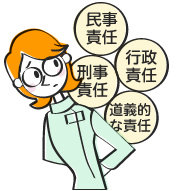One concept you encounter quite a lot in Japan is sekinin (seh-kee-neen), meaning responsibility or duty. While the James Clavell cliches of Japanese who are bound by the bushido-esque code of honor aren’t very accurate when applied to the country today, I have noticed that the idea of sekinin o toru, or taking responsibility for something, does seem to be an important aspect of the Japanese character. This can take many forms, with one of the most visible being the way students take responsibility for cleaning their own classrooms, including the toilets. Virtually all cleaning in Japanese schools is done by the students, who must learn to either take pride in their cleaning skills or study in a dirty classroom. The idea of sekinin is important in a business environment, too, and when some new job presents itself to us at here at J-List, I’m always interested in the way our Japanese staff divides the work into logical sections and assigns different parts to each person, so everyone knows who’s in charge of what. Having a person’s name associated with a job is one way to create a sense of pride, and in restaurants it’s common to see a little clipboard hanging in the restroom indicating which employee has last cleaned, so everyone knows who is or isn’t doing his job properly if there’s a problem. I often wonder whether some of these little innovations might not be imported back to the West?
Why Are There So Many Transfer Students in Anime? Let’s Explore Why This Trope Is So Popular!
Anime is all about the tropes. Whether it's red hair being reserved for girls with "fiery" tsundere personalities or student...














